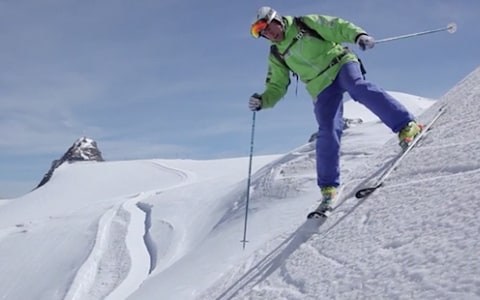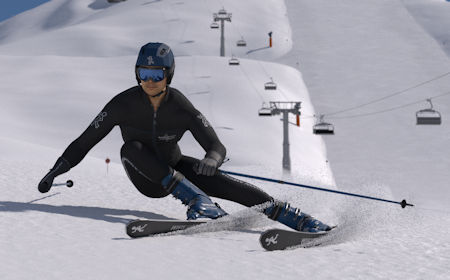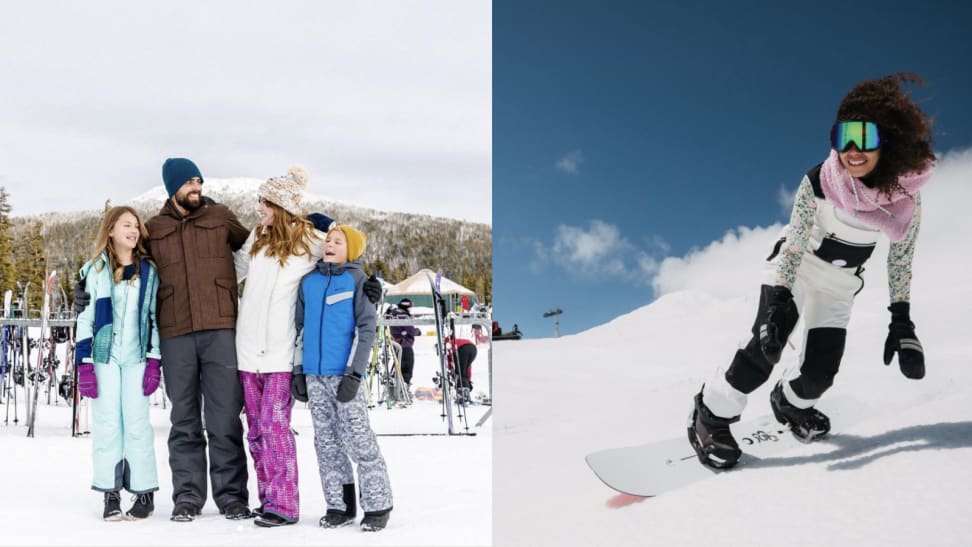
A ski is a pair long, narrow runners that connect to the skier's boot and are used to glide on snow. Skis can be made from metal, plastic, and wood. Sometimes, the term "ski" may also refer to a specific type or ski like a freestyle.
Many people are unsure what the ski is. This is especially true if you are talking about a ski resort. This article will explain the meaning of ski, some of the terms used to describe it, and what types of skiing are available.
Sidecut design is an important aspect of a ski. Having a wide point at the center of the ski means that the sidecut will increase as the ski approaches the ground. This is especially useful in conditions that have dense, moisture-laden snow. This reduces the ski's effective edge, making it easier to get on the edge.

Another factor is the skier's weight. For heavier skiers, a ski with greater power will be more able to handle difficult terrain. A lighter ski will make it easier to ride and be more responsive.
You may be new to skiing and not realize that skis can be made from more than one material. Some are made with plastic, while some are made from steel. However, if you want others to ski with you, you need to understand the slang associated with the sport.
You can also refer to a ski as "snow bunny", for example. This refers to a female skier. It is also possible to talk about an epic day' on a ski slope. Epic days are usually when there is lots of powder on the mountain. These days are ideal for skiers because they allow for big jumps.
Another word and phrase that you might use is 'pow’, 'apres skiing' and snowplow. If you are unfamiliar with these words, you will want to take a look at the Webster's New World College Dictionary, which offers several meanings for each. However, you should not rely on this source of dictionaries to determine the correct word or phrase.

Talking about the day's events is one of the best parts of skiing. It's especially fun to discuss a run you have done. Sometimes, it can be quite funny to hear other skiers use the same phrases and slang. Keep in mind that terminology borrowed from other countries is common. It can be confusing as in any foreign language.
It can be hard to remember all the lingo when you're learning about ski resort slang. A dictionary is an invaluable resource. A dictionary will allow you to search synonyms, anonyms, and other important definitions of words.
A dictionary is a portable and easy way to learn a word. You should always have a dictionary with you when you travel.
FAQ
What amount of luggage should I bring?
The amount of luggage you take depends on the length of your trip. You will only need to bring hand luggage if you're traveling by plane. This is typically less than 20kg. For a bus or train ride, however, you will require more space.
You will receive a form with all the details about your flight when you arrive at airport. This form will contain information about your flight, such as the weight and assistance required when you check them in.
Always check your luggage before you leave the house. You might find yourself stuck waiting in line for hours as everyone else inspects their luggage.
Travel light as you never know what may happen. For example, if your bag gets lost, you won't have anything to wear.
How can you travel light?
There is no right answer when packing for your trip. These tips will help guide you in choosing what to bring on your trip.
-
Only bring what you truly need.
-
Pack only what you'll actually wear.
-
Do not overpackage yourself with items.
-
Be sure to have plenty of space in your suitcase
-
Always make sure you have everything you need.
-
Take advantage of free storage facilities.
-
Reusable water bottles can be used instead of buying bottled.
-
Instead of carrying a suitcase, use a backpack.
-
If possible, take public transport and walk or cycle instead.
-
You can choose the right size bag.
-
Avoid carrying bulky items.
-
Be prepared for any eventuality.
-
You can't leave any trace.
Where should I store my luggage?
There are many options. Most people use airport lockers. They are generally located near security. They cost between $5-10 per day, depending on the locker size.
A storage unit can be rented. These are often found outside large hotels or shopping centers. Although prices vary, some places offer discounts for multiple units that are rented together.
You can also hire a porter. The porter will carry your luggage from your carousel to your bedroom. A small fee is charged each time the porter helps you.
What documents should I keep handy when traveling?
Keep copies of important documents in your car for quick access when on the go. You may also want to consider keeping copies of your passport, driver's license, and other official identification cards and any credit card information you might need if you plan to use an ATM machine.
A photocopy of your passport is always a good idea so that it can be used to prove identity in case of emergency.
Also, don't forget to include copies of your itinerary and reservations. These will help you remember where you are going and what you plan to see.
Also, keep a duplicate of your flight ticket as well as details about your hotel reservation. You can contact your family back home easily if you are in trouble.
It's a good idea to never leave valuables unattended. You can keep your valuables safe by keeping them in your wallet or inside your bag.
Avoid losing valuable items by making sure your luggage is checked before you depart.
Remember that it is always safer to be simple than to plan everything.
Relax and enjoy your trip!
Statistics
- No Checked Bags: No Alcoholic beverages with more than 70% alcohol (over 140 proof), including grain alcohol and 151 proof rum. (tsa.gov)
- That's an 18% jump from 2019, the previous record year. (travelandleisure.com)
- According to Maori legends, this park holds 14 fjords that were all carved by a giant stonemason with an adze. (busytourist.com)
- Alcoholic beverages with 24% alcohol or less are not subject to limitations in checked bags. (tsa.gov)
- Case in point: the private island of Ilha Caldeira, less than seven miles off the coast as part of the Primeiras and Segundas Archipelago, is located within the marine-protected area with 20 percent of the country's intact living coral. (travelandleisure.com)
External Links
How To
What are the best travel tips to beginners?
While traveling is an exciting experience there are many traps that you must avoid in order to enjoy a safe and enjoyable trip.
These are some basics to help you plan your next trip.
-
Book early. Book early to get lower prices. By booking in advance, you can save money on hotels and flights.
-
Stay-at-budget accommodations. You get more for your money in cheap hotels. They're usually located near public transportation and shopping centers.
-
Don't overpack. Pack light. Keep room for souvenirs. Make sure you bring clothes that fit well and don’t wrinkle easily.
-
Use common sense. Be careful if you're on your own. Avoid sketchy neighborhoods and areas where crime is high.
-
Prevent theft. Keep valuables away from prying eyes. You should never leave anything valuable at home when you go swimming.
-
Pay attention to cash. Thieves often target tourists in foreign cities. You can keep your money hidden by using ATMs within banks and guarded facilities.
-
You should know where you are. Be sure to learn how to use public transport in order not only do you need to book a hotel but also how to get there. Discover information about tourist attractions and restaurants.
-
Learn about safety. Learn about the culture, customs, laws and traditions of the area before you arrive.
-
Have fun. Enjoy the ride, no matter what. It is worth it.